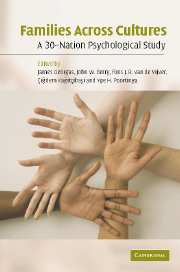Book contents
- Frontmatter
- Contents
- List of figures
- List of tables
- List of contributors
- Acknowledgments
- Prologue
- Part I
- 1 Families and family change
- 2 Cross-cultural theory and methodology
- 3 Theoretical perspectives on family change
- 4 Family portraits from 30 countries: an overview
- 5 Hypotheses
- 6 Methodology of the study
- 7 Results: cross-cultural analyses of the family
- 8 Synthesis: how similar and how different are families across cultures?
- Part II
- Appendix
- References
- Index
2 - Cross-cultural theory and methodology
Published online by Cambridge University Press: 10 December 2009
- Frontmatter
- Contents
- List of figures
- List of tables
- List of contributors
- Acknowledgments
- Prologue
- Part I
- 1 Families and family change
- 2 Cross-cultural theory and methodology
- 3 Theoretical perspectives on family change
- 4 Family portraits from 30 countries: an overview
- 5 Hypotheses
- 6 Methodology of the study
- 7 Results: cross-cultural analyses of the family
- 8 Synthesis: how similar and how different are families across cultures?
- Part II
- Appendix
- References
- Index
Summary
INTRODUCTION
In a psychological study of family across cultures we should consider how human behavior is related to culture. Cross-cultural psychology attempts to understand similarities and differences in human behavior in their cultural contexts (Berry, Poortinga, Segall, and Dasen, 2002). As such, it takes culture seriously as a factor in the development and display of individual behavior.
The first part of this Chapter introduces cross-cultural theory. We begin outlining by what we mean by culture, taking classical and more recent definitions of “culture” from the discipline of anthropology. Next, we present a relevant set of concepts from the discipline of human biology. Armed with these ideas from our two cognate disciplines, we then consider three broad theoretical approaches to how cultural and biological factors are reflected in the course of human psychological development (termed absolutism, relativism, and universalism). The complementary approaches of the “cultural,” the “indigenous,” and the “comparative” schools of thinking about cultural and biological influences are then related to these three theoretical approaches. Finally, we elaborate on our own position on these issues, adopting both indigenous and comparative approaches, and situating them within the universalist theoretical perspective.
The second part of the Chapter introduces an Ecocultural Framework that guides the research reported in this book. As cross-cultural psychologists, we examine how human behavior is adaptive to the cultural and biological contexts in which it is nurtured, and how all three domains (behavior, culture, and biological functioning) are adaptive to the broad ecological and sociopolitical contexts in which they are situated.
- Type
- Chapter
- Information
- Families Across CulturesA 30-Nation Psychological Study, pp. 51 - 71Publisher: Cambridge University PressPrint publication year: 2006
- 17
- Cited by

